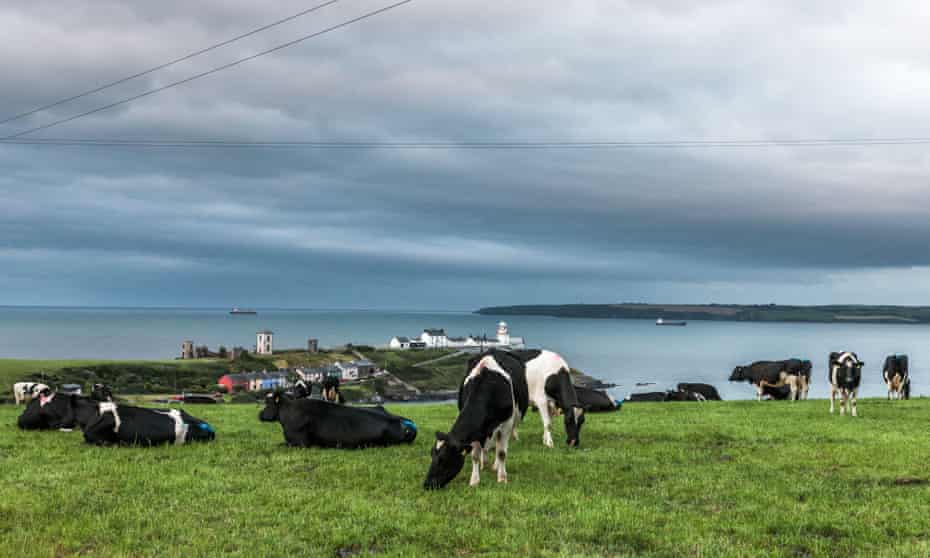Ireland would need to cull up to 1.3 million cattle to reach climate targets
With more than a third of the country’s greenhouse gases coming from farming, Dublin faces huge pressure over reduction aims

Last modified on Wed 3 Nov 2021 08.11 EDT
Up to 1.3 million cattle would have to be culled in Ireland to reach anticipated government targets for reducing greenhouse gases in the agriculture sector, a new report has concluded.
Irish farmers are expecting the worst after taoiseach Micheal Martin described the report by KPMG, commissioned by weekly newspaper the Irish Farmers Journal, as “scaremongering”.
The debate over agriculture’s role in reducing carbon emissions is a hugely controversial topic in Ireland, pitting Dublin against rural communities.
The country, which does not have a significant manufacturing sector, has long relied on farming, alongside multinational investment, to drive its economy. Irish beef and dairy brands such as Kerrygold and Pilgrims Choice are among its most successful exports.
But Irish agriculture is under huge pressure: 35% of national greenhouse gases come from the sector, the highest level in Europe, where the average is 11%. And more than 60% of that comes from methane associated with belching by ruminant animals.
More than 100 countries pledged to reduce methane emissions by 30% by 2030 in Glasgow on Tuesday in an initiative put forward by the US and the EU. Although methane breaks down relatively quickly in the atmosphere, it is a more potent greenhouse gas than carbon dioxide. Reducing these emissions has been touted as one of the most immediate opportunities to slow global heating.
Stephen Prendiville, head of sustainability at the EY consultancy in Dublin, said the debate about methane “had been lost” in the narrative about the climate emergency and this would help countries reliant on agriculture to focus on how to “operationalise” reductions.
Irish climate emergency plans
The Irish government is due to unveil its sector-by-sector climate emergency plans on Thursday and is considering a 21% to 30% cut in carbon emissions from the agriculture sector.
KPMG looked at four scenarios, concluding that rural Ireland faced a EUR4bn hit to the economy and the loss of more than 56,000 jobs if the government opted for the 30% target.
It also warned that a 30% cut would require a 20% cut in cattle numbers, 22% of the beef herd and 18% of the dairy herd.
With 6.5 million cattle in the country according to official Central Statistics Office data this equates to a reduction of 1.3 million of the national herd.
The lower target of 21% would mean a reduction of about 5%, or 325,000 cattle, according to the KPMG analysis.
“Farmers desperately hope that it doesn’t come to this [culling],” said Phelim O’Neill, editor of the Irish Farmers Journal. “There is widespread acknowledgement that we need to reduce emissions”, he said but he had commissioned the report to put some facts back into the “heated debate” that is giving famers “climate anxiety” about their futures.
The debate has pitted Dublin versus rural Ireland, with farmers feeling they are being unfairly targeted without government assessments of the impact on their industry.
The president of the Irish Farmers’ Association, Tim Cullinan, said it was “extraordinary” to hear the taoiseach say the report was scaremongering.
Martin told RTE on Tuesday: “I think we need to be very careful of that scaremongering,” after reports that targets at the lower end of the scale would result in 10,000 fewer jobs in agriculture. “Farming will have to change,” he said.
Cullinan said: “We have repeatedly asked for such an exercise to be carried out by our government, but they have refused to do so. Micheal Martin is shooting in the dark and he has no idea what the economic or social impact of these ceilings will be in rural areas.”
Ireland has committed to reducing carbon emissions by 50% by 2030 with a cabinet subcommittee meeting on Wednesday to finalise the sector details.
Martin told RTE the country had “no choice” and if it did not commit to the targets it would affect the country’s “economic sustainability”. He also admitted that over the past decade carbon emissions in the country had increased and “that is problematic”.
Sign up for the Animals farmed monthly update to get a roundup of the biggest farming and food stories across the world and keep up with our investigations. You can send us your stories and thoughts at animalsfarmed@theguardian.com

